UArizona Health Sciences Awarded $7.7M to Study Viral Immunity in Essential Workers
TUCSON, Ariz. — To better understand the complexities of immune system response to the novel Coronavirus , researchers at the University of Arizona Mel and Enid Zuckerman College of Public Health and the UArizona College of Medicine – Tucson have received major federal funding to evaluate the viral immunity of Arizona essential workers.
The two UA Health Sciences college have been awarded $7.7 million from the U.S. Centers for Disease Control and Prevention to conduct a study, “Arizona Healthcare, Emergency Response, and Other Essential workers Surveillance,” or AZ HEROES. The study has two goals: to evaluate incidence of asymptomatic and symptomatic re-infection among the state’s frontline workers (health care personnel, first responders and other essential workers) and to establish patterns of COVID-19 immunity over time in previously and newly infected individuals who test positive for COVID-19 antibodies.
The UArizona News press release about the AZ HEROES study can be read here: https://news.arizona.edu/press-release/uarizona-state-arizona-expand-eligibility-covid-19-antibody-testing-concert-77m-study

Jeff Burgess, MD, MPH, MS
Jeff Burgess, MD, MPH, MS, associate dean for research and a professor at the Zuckerman College of Public Health, serves as principal investigator for the CDC grant.
“The research questions we aim to answer will provide much-needed data for decision-making as we continue to confront the pandemic,” Dr. Burgess said. “The study results will help us understand how long immunity to COVID-19 persists and if repeat infection is different than initial infection. This information is critical for essential workers as they continue to be exposed to COVID-19 through their work.”
The AZ HEROES research team plans to enroll 4,000 health-care workers, first responders, frontline workers and other essential workers as participants across Arizona within four months for this year-long study.
Bonnie LaFleur, PhD, MPH, a research professor of biostatistics at the UArizona BIO5 Institute is co-investigator. Dr. LaFleur brings expertise in quantitative activities as demonstrated by her scientific background in assay development, precision medicine and infectious diseases, building on 20 years of experience in leading quantitative cores as part of large extramurally funded National Institutes of Health and National Cancer Institute grants.
Janko Nikolich-Zugich, MD, PhD, head of the College of Medicine – Tucson’s Department of Immunobiology and co-director of the Center on Aging will oversee the biological analyses conducted at the UA, including the antibody analysis and neutralization assays.
The research is made possible in coordination with the statewide AZ COVID-19 Antibody Testing Initiative conducted by the UArizona in collaboration with the State of Arizona. By mid-August, the initiative plans to complete antibody testing of 250,000 Arizonans, including health-care care personnel, first responders and essential workers statewide. The serologic antibody test is 90% sensitive and 100% specific. All participants indicate whether they consent to being contacted for future research. The AZ HEROES study will enroll 4,000 of these individuals, including 2,000 participants with COVID-19 antibodies and 2,000 participants without COVID-19 antibodies, based on the statewide AZ COVID-19 Antibody Testing Initiative participant pool.
Other researchers involved in the study span the UArizona Health Sciences campus include Karen Lutrick, PhD, assistant professor in the Department of Family and Community Medicine at the College of Medicine – Tucson, and Kate Ellingson, PhD, and Joe Gerald, MD, PhD in the Zuckerman College of Public Health.
In addition to the funding for this study, Dr. Burgess recently received CDC funds for the RECOVER Project, a study involving Research on the Epidemiology of COVID-19 in Emergency Response and Healthcare Personnel (RECOVER), involving an existing cohort in cooperation with the Tucson Fire Department. The UArizona is collaborating with the University of Miami and fire departments in the Miami area on this project as part of a larger CDC grant administered through Abt Associates, a private company, that will oversee multiple COVID testing studies in cohorts of target populations.
The AZ HEROES award is the most recent award for Dr. Burgess and his colleagues. The study will build on a base of research with first responders that spans decades and has yielded significant public health data to improve the health and lives of first responders across the country.
About the University of Arizona Mel and Enid Zuckerman College of Public Health
Established in 2000, the Mel and Enid Zuckerman College of Public Health at the University of Arizona Health Sciences is the first nationally accredited college of public health in the Southwest. Today the college remains the only accredited college of public health in the state of Arizona, with campuses in Tucson and Phoenix. The college enrolls more than 1,100 students per year across degree programs at the bachelor's degree, master's degree and doctoral levels. Through research, education and community engagement, the UA Zuckerman College of Public Health continues to find solutions to public health problems in Arizona, the Southwest and globally. For more information: publichealth.arizona.edu (Follow us: Facebook | Twitter).
About the University of Arizona Health Sciences
The University of Arizona Health Sciences is the statewide leader in biomedical research and health professions training. The UArizona Health Sciences includes the Colleges of Medicine (Tucson and Phoenix), Nursing, Pharmacy, and the Mel and Enid Zuckerman College of Public Health, with main campus locations in Tucson and the growing Phoenix Biomedical Campus in downtown Phoenix. From these vantage points, the Health Sciences reaches across the state of Arizona and the greater Southwest to provide cutting-edge health education, research and community outreach services. A major economic engine, the Health Sciences employs nearly 5,000 people, has approximately 4,000 students and 900 faculty members, and garners $200 million in research grants and contracts annually. For more information: uahs.arizona.edu (Follow us: Facebook | Twitter | YouTube | LinkedIn | Instagram).

